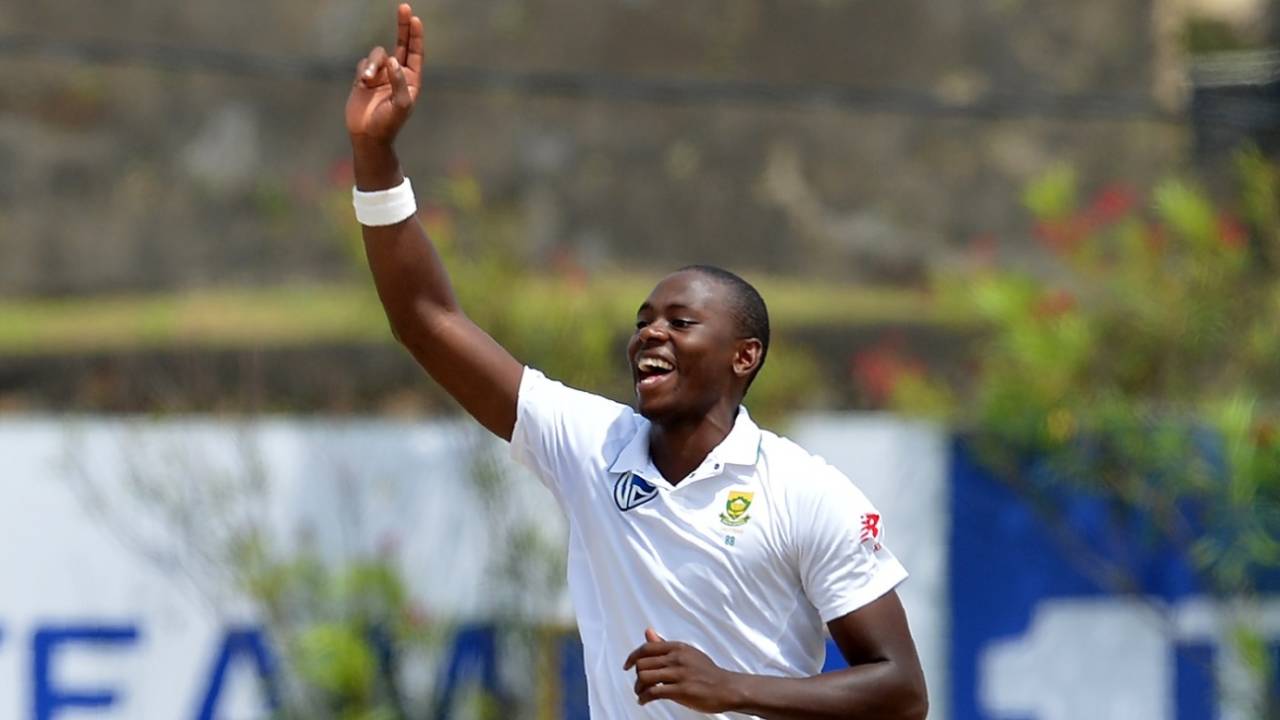Kagiso Rabada: My wicket celebrations stem from 'passion'
His send-offs have earned him suspensions, however, and he's looking for ways to express himself differently
Firdose Moonda
01-Jun-2020
Kagiso Rabada celebrates a wicket • AFP
Kagiso Rabada believes that his enthusiastic wicket-taking celebrations, which have led him to fall foul of the ICC's code of conduct several times, stem from "passion", but he has suggested he is looking for ways to express himself differently. Speaking from lockdown, Rabada indicated he has been using some of his time to consult with mentors after what he called a "disappointing" past summer.
"It's passion, but everyone has their opinion and they are entitled to their own opinion," Rabada said. "I have identified things that I needed to identify and I will address them with the people that are closest to me and who I feel should be helping me address it."
Who those people are, Rabada did not get into, but it's likely at least one of them is his father Dr Mpho Rabada, who is involved in everything from supporting his son from the sidelines to getting his musical side-hustle. Rabada senior released a single in February, the day before Rabada played what would be his last game for South Africa - a T20I against Australia - before cricket came to a worldwide standstill. A groin strain ruled him out of the subsequent ODI series and South Africa's aborted series in India, leaving him to reflect on the season as a tough one.
"The past season was a disappointment," Rabada said. "Even though I see that my stats are okay, I just felt really rusty and a bit out of place."
The 2019-20 season, in which South Africa lost Test series away to India and at home against England, was Rabada's leanest to date in the longest format. He played six Tests, and took 21 wickets at 32.85 - it was the first time he had finished a season with an average above 30. He would have played a seventh Test but was suspended from South Africa's final fixture against England in Johannesburg after picking up a demerit point for screaming in Joe Root's face after dismissing him in Port Elizabeth. Rabada already had three other points to his name, thus forcing him to spend a Test on the bench.
It was not the first time Rabada had been forced out of a match because of a code-of-conduct breach. In July 2017, he had to miss the second Test against England at Trent Bridge and in March 2018 he was due to sit out both the third and fourth Tests against Australia after a shoulder brush with Steve Smith but CSA hired a top-level advocate to head up Rabada's appeal.
Rabada's transgression was downgraded from a Level 2 offence to a Level 1 violation, but he acknowledged he needed to change his behaviour. However, Faf du Plessis, until recently the Test captain, has consistently said South Africa don't want Rabada to lose his aggression. South Africa's coaching staff have echoed du Plessis' thoughts, but voices from abroad, notably the commentator Michael Holding, who shares a close relationship with Rabada, have taken the counter approach and hoped Rabada reins himself in.
Rabada is careful not to read to much into outside opinion. "Everyone will always criticise you in some way. It's important that you don't take what people say to heart," Rabada said. "You will always have a lot of critics. Not everyone will agree with what you do. As long as you are true to yourself you can grow. What other people say about you shouldn't affect you at all."
The insular nature of the lockdown period means that Rabada has had more than enough time to shut out the noise, fully recover from his groin niggle, and even branch out into non-cricket-related projects. "I am really glad I can get a rest, not in the way that it has come but I am really enjoying my time," he said. "It's allowed me to think about what I really want and makes it easier to set goals."
Together with this friend Cameron Scott, Rabada has started a podcast called The Viral Wellness, which aims to raise awareness about issues arising from the coronavirus pandemic. The pair have also worked on creating a Healthy at Home handbook, to help people cope with the challenge of being under lockdown. Rabada is also looking at ways to help those who are in need of financial assistance at this time. "A lot of people in the country are economically challenged," he said." "South Africa is the most unequal country in the world, so it's good to lend a helping hand, especially now."
Firdose Moonda is ESPNcricinfo's South Africa correspondent
